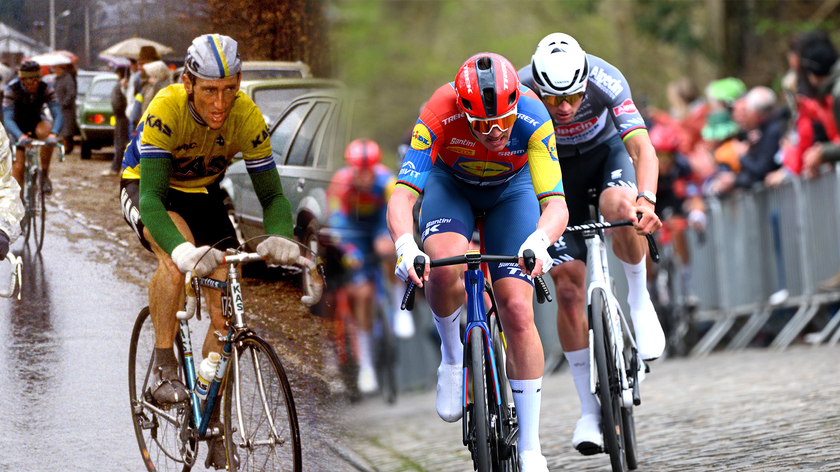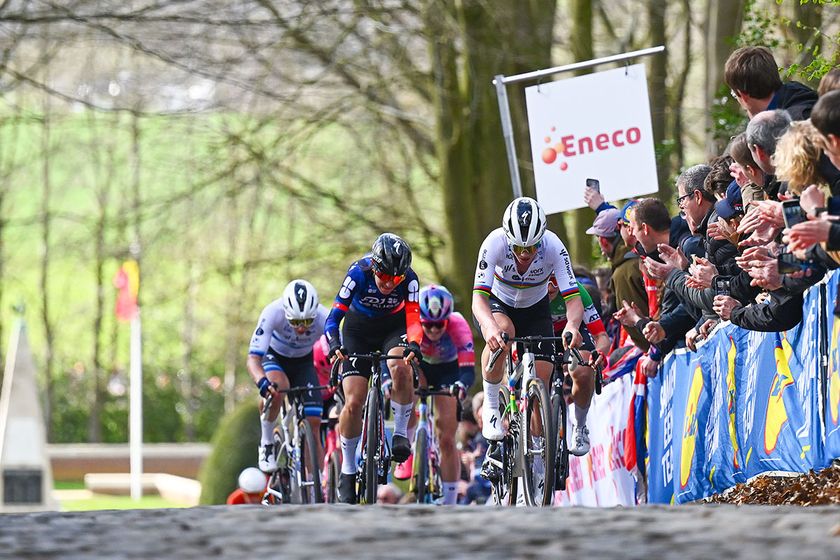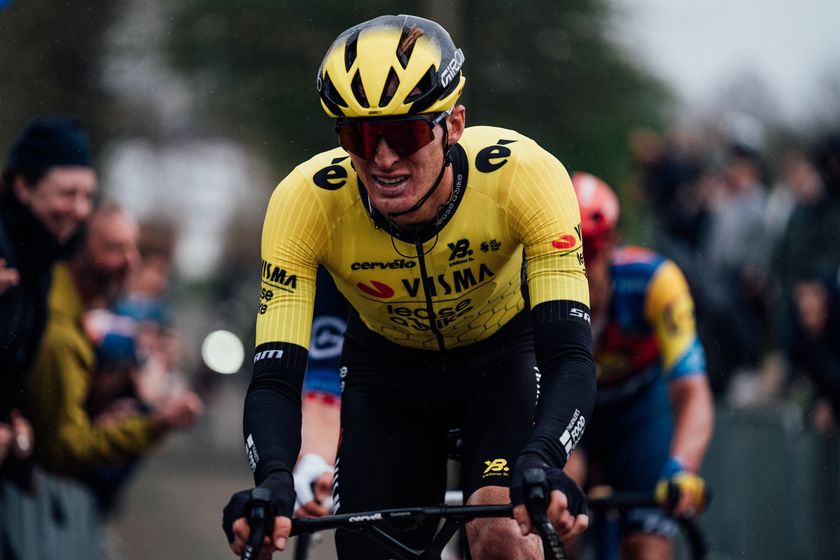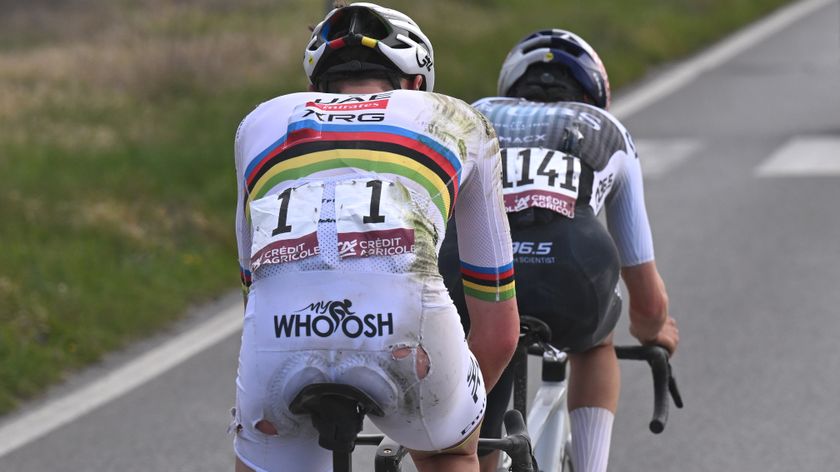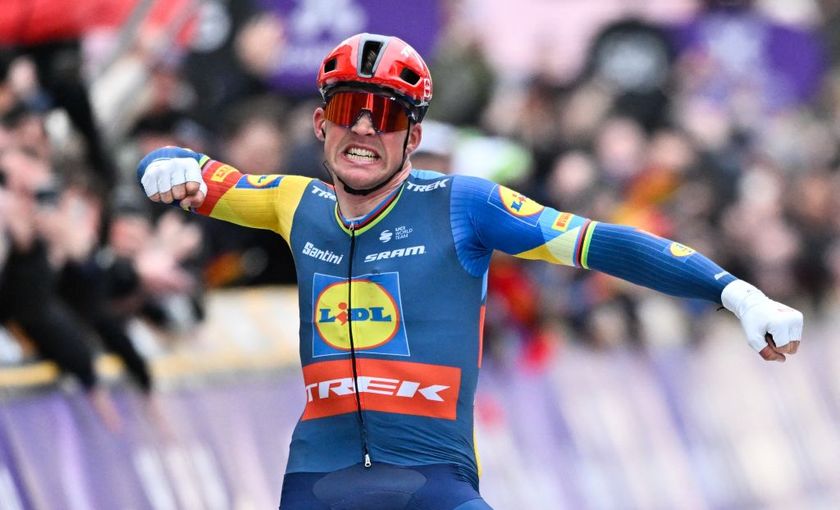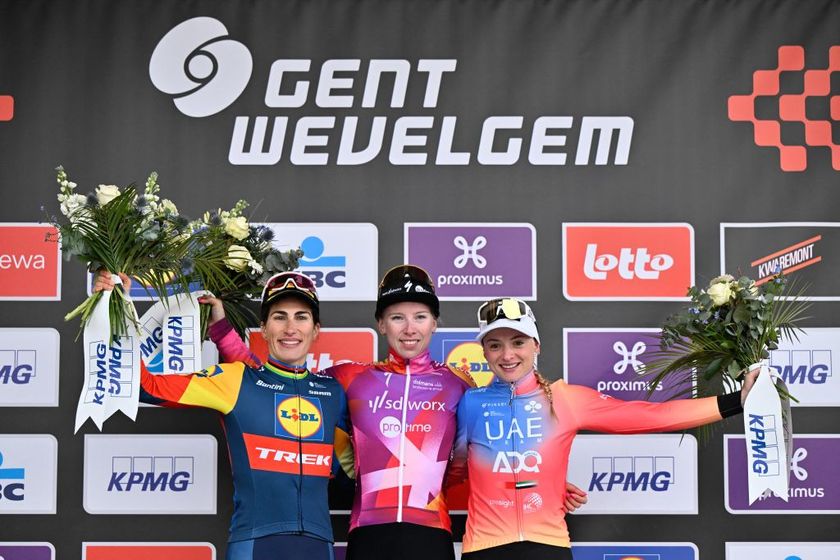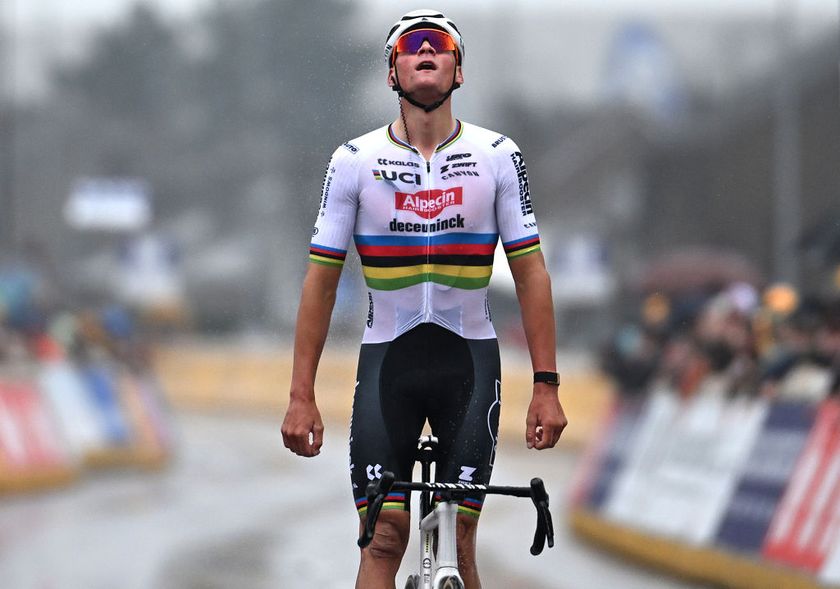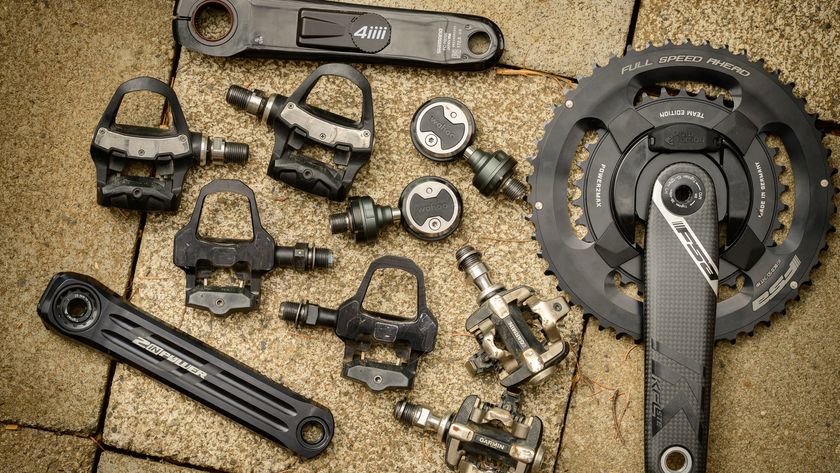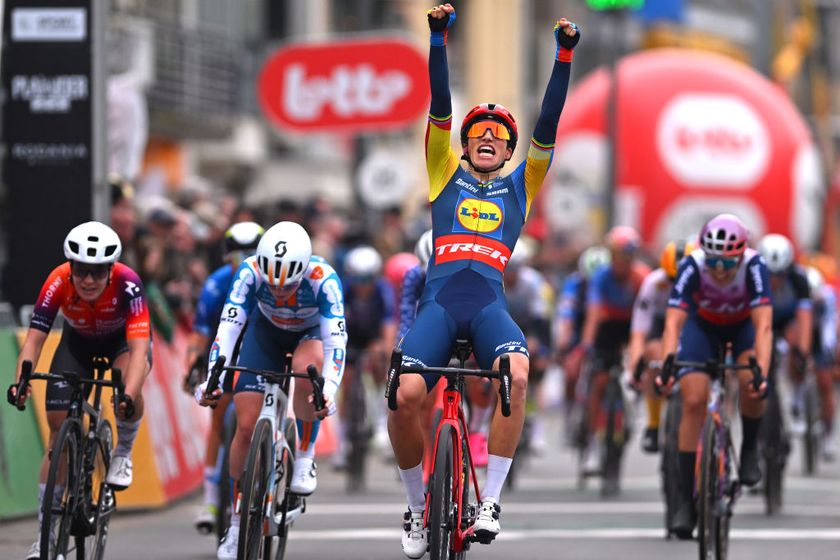Life after Postal: Coaching Landis and a new Endeavour - part 1
Robbie Ventura ended his career as a professional cyclist in dramatic fashion toward the end of...








An interview with Robbie Ventura, February 16, 2005
Robbie Ventura ended his career as a professional cyclist in dramatic fashion toward the end of 2004, crashing in the final turn of the USPRO Criterium Championships, held near his home town of Chicago. It was a race Ventura desperately wanted to add to his palmares, but as he tells Mark Zalewski, he is completely satisfied with his racing career and looking forward to new challenges including driving the Endeavour team car and coaching Floyd Landis.
Robbie Ventura has been a mainstay in the professional U.S. cycling scene for more than a decade - racing with all of the top teams, including Saturn, Navigators and for the last several years, US Postal. A former collegiate and minor-league hockey player, Ventura switched to cycling after an injury cut his hockey career short.
Now retired as a racer, Ventura is switching tracks to focus on his coaching business, Vision Quest, and his new role as directeur sportif of the Advantage Benefits/Endeavour Cycling Team of former Saturn head Tom Schuler. I kicked off by asking him what he'd been up to since announcing his retirement.
Robbie Ventura: You think things are going to get a little easier and simpler, but they end up getting more... it's just different, more time intensive. As a cyclist you train, go to sleep, do fun stuff, and hang out with your kids - kinda get yourself on a little bit of a schedule. But now I am out of a schedule which I don't like. I'm in the office, coaching athletes, being director-sportif-slash-manager of this new cycling team. I'm organizing training camps, doing some public speaking. There are just so many pieces and so much stuff it's just trying to get myself in a routine. Athletes like routine. It makes sense for an athlete ... - but I'm in this transition period now and I've lost my routine. Not to say it was bad, it's a little fun being scattered at times! I want to get something more regimented.
But what have I been doing? I've started this coaching business about four years ago and it's been growing. We're moving to a bigger facility in Lake Bluff, IL. It will be twice as big. We're opening up a second facility in Chicago [Bucktown] with a massive grand opening and we also have a satellite pod in Bloomington, IL. So we're starting to grow and it's been a fun process. I've hired some other coaches that are good people and great coaches. And this new venture with Tom [Schuler] and this new venture with Floyd. Taking on Floyd as an athlete is a lot of responsibility, and you want to get everything just right. There is a lot of communication there.
I've also taken on some other professional cyclists - Ed Hilger, Wes Hartman, Dave Sacks, Frank Pipp. And when you have those kinds of names with that kind of talent, you want to make sure you do everything just right, because they have already done so well on their own. And when you introduce a coach, you hope they get better! And we have a ton of very dedicated and passionate athletes here at Vision Quest, and you want to give them the same service that you give Floyd.
Get The Leadout Newsletter
The latest race content, interviews, features, reviews and expert buying guides, direct to your inbox!
Floyd Landis
CN: Taking on Floyd Landis' training is a huge responsibility and opportunity. What are your goals that you two have set forth?
RV: Not to screw things up, right? [laughs] He has such an amazing year, and the last thing I want to do is to have him be injured, or not give him enough, or to give him too much. So, I think what he did last year worked well for him. We are going to take that and try to be a little bit more scientific, in terms of specific burn rates, power and wattages at different times of the year, look at his critical power at various times of the season and generally just keep him healthy. He is very talented and he has unbelievable will and desire to do things. That paired with his talent, I think he can do a lot as long as he stays healthy. And that is a huge responsibility for the coach. He needs to teach the athlete to monitor himself, and then be able to monitor him on top of that.
Floyd and I have a great relationship, and I think that personal and coaching relationship that we have makes things a lot easier. Anything that happens or anything that goes on, he calls me right away. There is no lag time. That is huge. My best results with coaching have been athletes that I've been comfortable bouncing things off of. Floyd is very educated and knows a ton about the sport, and so am I. He can use me as a sounding board. Not to mention, we have Allen Lim, Arnie Baker and Mark Zions on our advisory board. And if I can't handle it, trust me, one of them can!
CN: Do you plan on making any big changes in Floyd's training program?
RV: Not really. I think the biggest change for Floyd this year is that he is not going to be doing as much racing, and when you aren't doing as much racing you have to subsidize the program with something that acts like racing. There might be some more intense intervals to fill that void that racing less is going to leave. He has ideas and numbers from last year, so as long as we are hitting or beating those numbers I feel comfortable with what we are doing.
CN: How and when did this coaching relationship between you two develop?
RV: Last year I had talked to him about a couple of different things. I've been lucky in my life to be exposed to a lot of great coaches - Rene Wenzel, Doug Close, and a bunch of different people. And I'm like a sponge when it comes to [coaching], I love it! Training, coaching and racing, the physiological side, the performance side, the tactical side - I love it all. There are so many aspects to it. The more I work with athletes the more I learn the tactical side of it - learning to conserve plays such a huge roll in an athlete's success. Growing up in the velodrome and having my father as a mentor and constantly preach to me, 'Position, sit on the wheel!' to get in the most efficient position and to not give away energy - I grew up with that. It's made me successful in the sport. I don't have tremendous aerobic ability. I have good explosive and good sprinting abilities, but my best ability is reading a race and to conserve. That is something I've always tried to preach upon Floyd, because he has this major engine, and I said, 'Floyd, if you just learn a little about conserving...' and obviously he has!
I had Floyd come in and talk to some of our Vision Quest athletes, to motivate them at the end of the year. He came in and saw our operation here, and we talked extensively about training and last year. I was giving him my ideas about next year, about how I think he could win the Tour de France - I always say that to him and he laughs and smiles, but deep down I think he knows he has a chance. Everyone at that level needs to think he has a chance, or they have no chance. We started talking about it, and I told him to do X, Y and Z. He sent me some numbers and I went over them. And then we made it official.
Past Career
CN: You've had a long and successful career - what are some of the highlights for you from that past eleven years?
RV: I gotta be honest, I was very lucky because I was very good friends with Tom Schuler and he gave me my very first break as a cyclist. We rode for the same NCL team, the old NCL league. He got a glimpse of me there. I was really fast but had no endurance or sustained power - I grew up on the track and always raced on the track. But I never had that five year base that it takes to make that jump [to the road.] He did me a tremendous favor when I graduated from college, he put me on the Saturn Cycling Team. I had results to back it up, but it was Tom who gave me my first break. And now we are working together on this Endeavour team and we really get along great. We have a lot of laughs together - we are both Wisconsin guys! We have a lot in common together. I respect him a lot and I really appreciate that first job with Saturn.
Then it grew from there - I raced another year with Saturn, three with Navigators which was as phenomenal time with Ed Beamon. I think the world of that guy. He has a good heart and really takes care of his athletes. Then I went back to Saturn, which was an unusual thing. When you go from one team to another, you don't go back to the team. But if you want to hear a crazy story about that...
My second year on Saturn was the year I got married and Tom actually had to let me go. I wasn't really ready for professional racing. I had these goofy braids in my hair, and I wasn't a dedicated professional. I was a college kid who has just graduated and was just married, and liked cycling but didn't have a passion for it. I didn't train like I should have, and it cost me. I was let go, and I went back to my wife and said, 'Laurie, let's just move on.' And she said, 'No, let's give it one more year, I believe in you one-hundred percent. I want you to go down to Arizona and really give yourself a chance. You've never done it. I want you to go down there and do it like everyone else does.'
Sure enough, after we got married - I feel bad about doing this - we got married in December and mid-way through January I went to Tucson and started training. I spent two weeks, then she came down and spent a week and went home, and I trained another couple of weeks. When she came back down it was my first race after two real months of hard actual base training. I had no jersey, just a pink skinsuit, because I had no team! My first race was out in Scottsdale the week before Valley of the Sun. I was so excited to test out my new form. I was a few pounds lighter and Laurie was there. I went out there, and the first lap I got dropped! The FIRST lap! I was so depressed. I said, 'Thank you for the support on this honey, but I'm done.'
But she was like, 'No, we talked about Valley of the Sun. Let's do it and make our decision after that.' So that whole week I rested and we had a great time. We went out and had ice cream, and had a vacation. Then I went and did Valley of the Sun, and in the road race I got seventh. In the criterium, a lot of big teams were there and I won the criterium - in a pink jersey all by myself! I just remember not believing it. I was so tired from all of that training that my body wasn't used to it. I hadn't rested, or peaked. I took a week off and all that training caught up with my body. After that I had Shaklee and Navigators interested in me.
I got a really good offer from Navigators and things took off from there. I had three great years with Navigators, two more with Saturn, and four years with Postal Service. It was a crazy turning point in my career and thanks to my wife. Laurie is the sole reason why my life has gone in the direction it has, and I couldn't be happier.
CN: It was a bittersweet ending for your career last year at Downers Grove, crashing in the final turn with a chance to win that very elusive race.
RV: It would have been nice to have, but Jonas [Carney] has been a good competitor of mine my whole life. A fellow Midwesterner and he is very talented and fast. He truly is one of the best criterium riders this country has ever seen, and it's a fitting end that he goes out wearing the jersey. For that, I think justice was served.
I think I had the chance, the legs and the preparation to do well in the final sprint. I was in great position and things were going well. But it's really tough to beat Jonas in a 150 meter dash to the line though. The thing I take away from that fall is you got to go for the win, rather than just try to get in there. That is how I've raced throughout my career. I felt that I had done everything I could to prepare for that race. I felt that I was getting better and better each week leading up to the race. So I was excited and happy the way it turned out, that I had nailed [the preparation] for once.
Over the last couple of years of my racing career I have become a lot more mellow, in terms of my racing style. I used to be fiesty and mean - way more aggressive. I had taken a step back and preserved myself a little bit, and worked on getting a lot stronger so I wouldn't have to be so mean, I could just take a wheel. But in that race, it was very important and I knew it was going to be one of my last races, and I had gotten the old mean instinct back. It felt good to know I still had that. But I was fulfilled when I was done. I went for it, overcooked it a bit too much, and that's that. If I had been in bad position or not had my legs that day, I would have been mad.
CN: When you aren't directing the team or on the phone to Floyd in Europe, are you going to be suiting up for some races next year?
RV: For sure, I'll be riding with the Endeavour masters elite team. We have a tough team. We have Thomas Craven, Todd Hancock, Billy Jones, Brian Hass, John Hughes, Chris Bolling, Mark Olson and Tom Schuler. It's a tough team and a team I'm going to have to step up to compete with these guys! I haven't been training much at all since Downers Grove. I've really been focusing on the business and my retirement, and helping out Floyd. A lot of the sponsors are also bike riders! I want to show them what a real lead-out feels like and give them a chance to win.
CN: Do you plan on racing with your younger riders at smaller races this season - to show them the ropes?
RV: On some of the smaller races, like Superweek, I'll be racing with the elite amateurs - we have two on the team. I'd love to get out there and mix it up with those guys - be on the road with them and help them out. It'll probably take me three or four months before I can get in shape and really help them out.
CN: So we will still see you out in the U.S. peloton from time to time? Are you nervous about not being in the same shape as you once were?
RV: Yeah, but I am more nervous about driving that team car! But hopefully Tom will sit shotgun for me for the first few races.
In part two Ventura talks about his role at Endeavour, the state of the sport, the drug issue and his burgeoning coaching business.
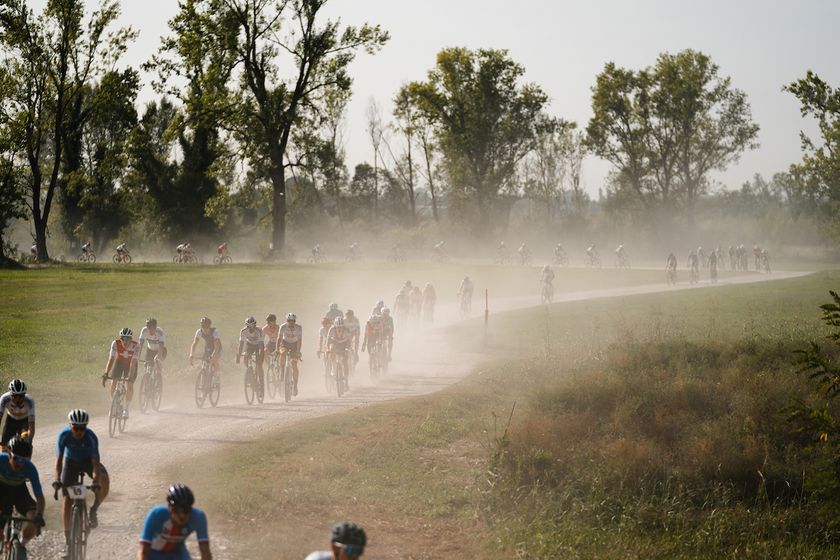
UCI Gravel World Series – Matthew Holmes and Lucia Gonzalez Blanco win 114 Gravel
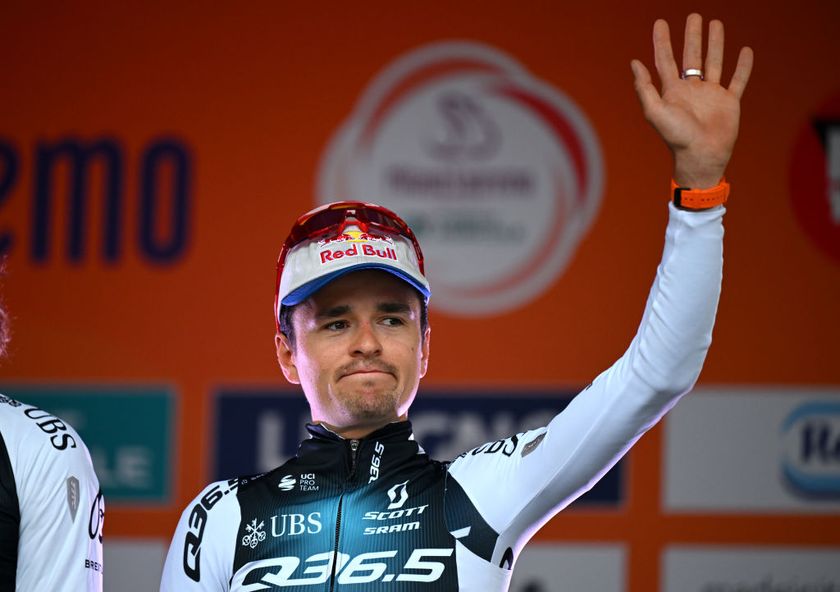
Giro d'Italia: Tom Pidcock's Q36.5 team, along with Tudor, Polti and VF Group-Bardiani secure wildcard invitations
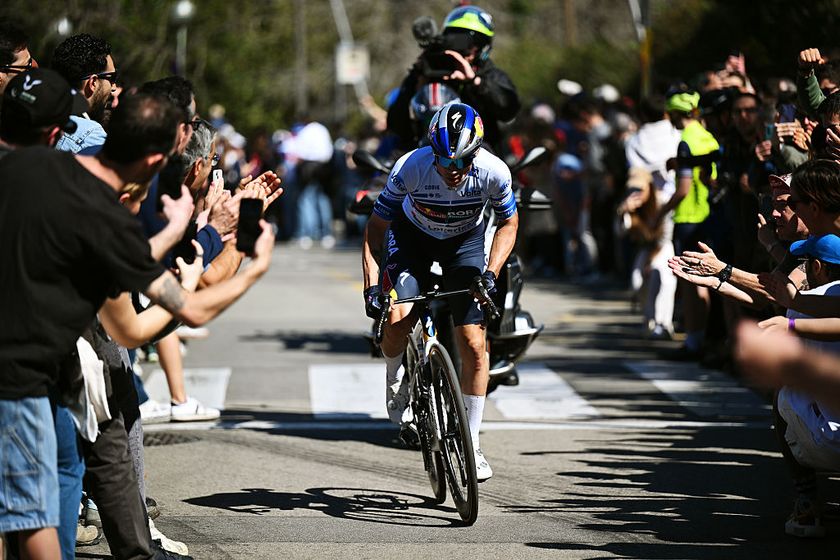
The inevitable march: A vintage Primož Roglič performance at Volta a Catalunya - Philippa York analysis
